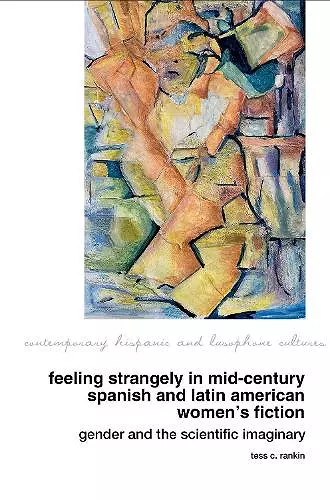Feeling Strangely in Mid-Century Spanish and Latin American Women’s Fiction
Gender and the Scientific Imaginary
Format:Hardback
Publisher:Liverpool University Press
Published:2nd Jan '24
£30.00
Supplier delay - available to order, but may take longer than usual.

This book explores the influence of early twentieth-century scientific discourse on gender in Hispanic and Lusophone societies, focusing on women's literature. Feeling Strangely presents a unique analysis.
In Feeling Strangely in Mid-Century Spanish and Latin American Women’s Fiction, the author delves into the transformative impact of early twentieth-century scientific discourse on gender perceptions in Hispanic and Lusophone societies. Through the lens of popular scientific writings, the book examines how these evolving understandings influenced various aspects of life, including politics, culture, and social norms. The integration of scientific ideas into everyday experience reshaped the narrative surrounding femininity, particularly in the context of literature authored by women.
The analysis centers on the 'strange' femininity portrayed by young female protagonists in four significant novels: Rosa Chacel’s Memorias de Leticia Valle, Norah Lange’s Personas en la sala, Carmen Laforet’s Nada, and Clarice Lispector’s Perto do coração selvagem. Each of these works is paired with a relevant scientific theme that resonated with the public imagination during that era. The author argues that these protagonists embody a vision of womanhood characterized by a sense of strangeness, reflecting the complexities of their lived experiences.
Building upon Carmen Martín Gaite’s concept of chicas raras, the book posits that this strangeness is fundamental to understanding gendered experiences. It highlights how affective and material engagements with the world shape the identities of these young women, ultimately contributing to a broader discourse on gender in mid-century literature. Feeling Strangely offers a rich exploration of the intersections between science, gender, and literature, providing valuable insights into the cultural landscape of the time.
‘This is an elegant and deftly argued book with a radical feminist proposal at its heart. It is beautifully written (and is enormously enjoyable to read) and is a work of first-rate scholarship and originality.’ Claire Lindsay, University College London
ISBN: 9781837644742
Dimensions: unknown
Weight: unknown
208 pages